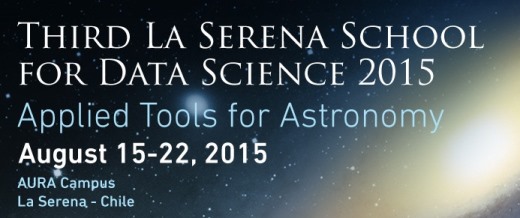- A
- A
- A
- ABC
- ABC
- ABC
- А
- А
- А
- А
- А
- HSE University
- Faculties
- Faculty of Computer Science
- Big Data and Information Retrieval School
- News
- La Serena School for Data Science: Applied Tools for Astronomy
-
The School
-
Departments

+7 495 772-9590
27342

+7 495 772-9590
27334
Vereshchagin N., Milovanov A.
In bk.: 32nd Computational Complexity Conference. Вадерн: Schloss Dagstuhl – Leibniz-Zentrum für Informatik, Dagstuhl Publishing, 2017. P. 1-18.
Figurnov M., Collins M. D., Zhu Y. et al.
arXiv:1612.02297. arXiv. Cornell University, 2016

La Serena School for Data Science: Applied Tools for Astronomy

La Serena School for Data Science: Applied Tools for Astronomy
2015 Program Dates: 15-22 August
REGISTRATION OPEN FOR THE 2015 PROGRAM: APPLY NOW!
NOTE: The Registration Deadline has been EXTENDED TO 22 MAY 2015.
The volume and complexity of astronomical data continues to grow as the current generation of surveys come online (PanSTARRS, Dark Energy Survey, VISTA). Astronomers will need to work with giga, tera and even petabytes of data in real time (LSST). This poses the challenges of developing and using new tools for data discovery, access, and analysis. At the same time, there are new opportunities for interdisciplinary research in applied mathematics, statistics, machine learning, crowd-sourcing, etc. Astronomy provides a sand-box where scientists can come together from diverse fields to address common challenges within the "Big Data" paradigm.
The LA SERENA SCHOOL FOR DATA SCIENCE: Applied Tools for Astronomy is an intensive week of interdisciplinary lectures focused on applied tools for handling big astronomical data. Participants will be instructed in how astronomical data are processed, accessed and analyzed, including reduction pipelines, databases, and scientific programming. The School will be taught by an international and interdisciplinary group of professors who will use real data and examples. Participants will work on team-based projects and be provided training and access to the National Laboratory for High Performance Computing located at the University of Chile's Center for Mathematical Modeling.
REGISTRATION for the 2015 program is now OPEN. Students interested in attending the School should apply before May 22, 2015. Our 1-page poster is available in PDF for distribution or posting on departmental bulletin boards.
Lecture topics include:
- Astronomical Data Acquisition
- Processing pipelines
- Astronomical Databases
- Virtual Observatory
- High Performance Computing
- Statistical tools applied to Astronomy
The Schools take place annually in August on the AURA Observatory campus in La Serena, Chile. Students from different disciplines are encouraged to participate, including (but not limited to) astronomy, computer science, statistics, and mathematics. There is a registration fee for participants, which covers room and board (except dinners) and travel to the school. Thanks to the support of the U.S. NSF and CONICYT in Chile, scholarships will be available for most participants from the U.S. and Chile. See the annual program page for more information.
All information you can find on web-site: http://www.aura-o.aura-astronomy.org/winter_school/
- About
- About
- Key Figures & Facts
- Sustainability at HSE University
- Faculties & Departments
- International Partnerships
- Faculty & Staff
- HSE Buildings
- HSE University for Persons with Disabilities
- Public Enquiries
- Studies
- Admissions
- Programme Catalogue
- Undergraduate
- Graduate
- Exchange Programmes
- Summer Schools
- Semester in Moscow
- Business Internship
- © HSE University 1993–2025 Contacts Copyright Privacy Policy Site Map
- Edit
